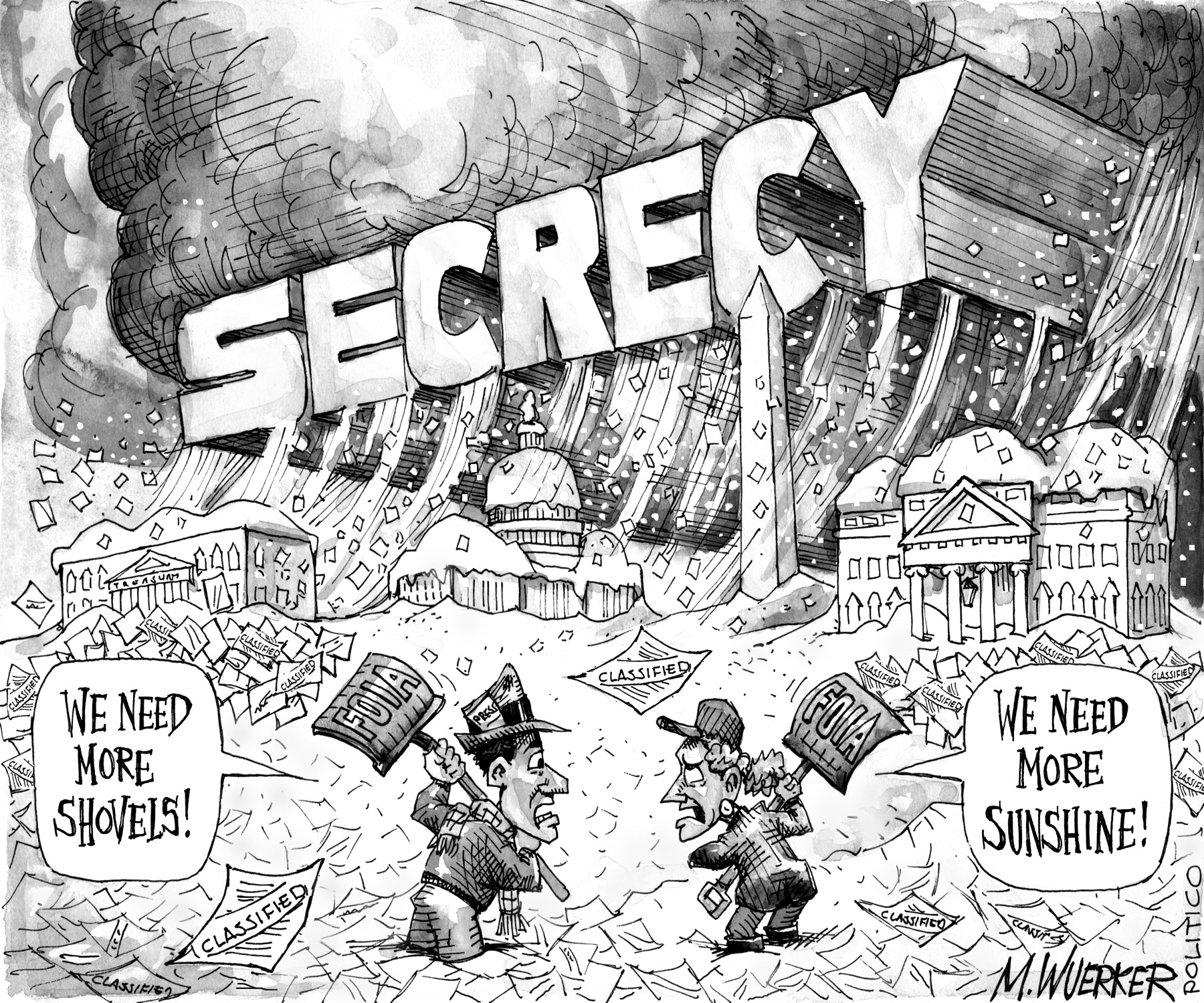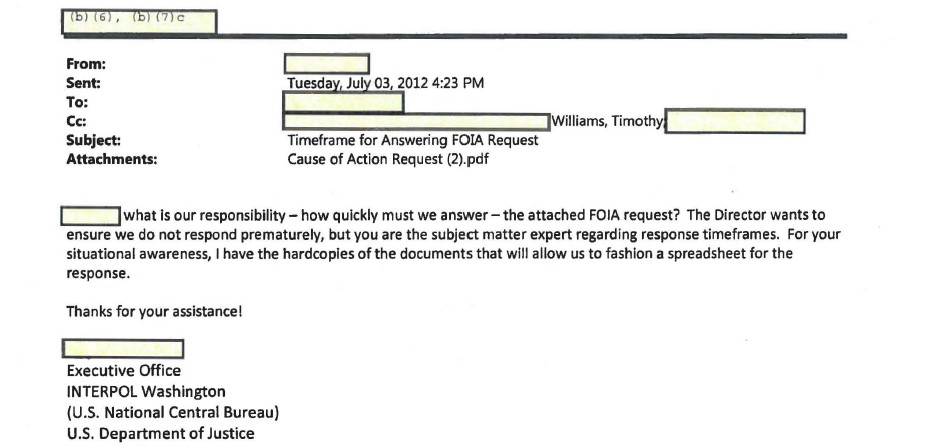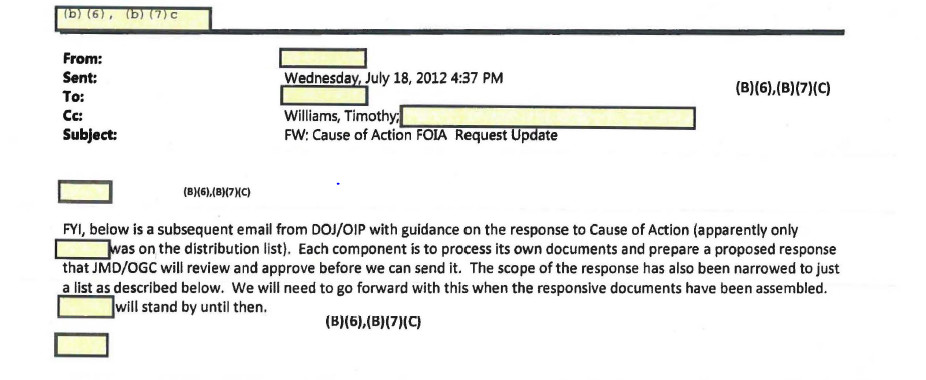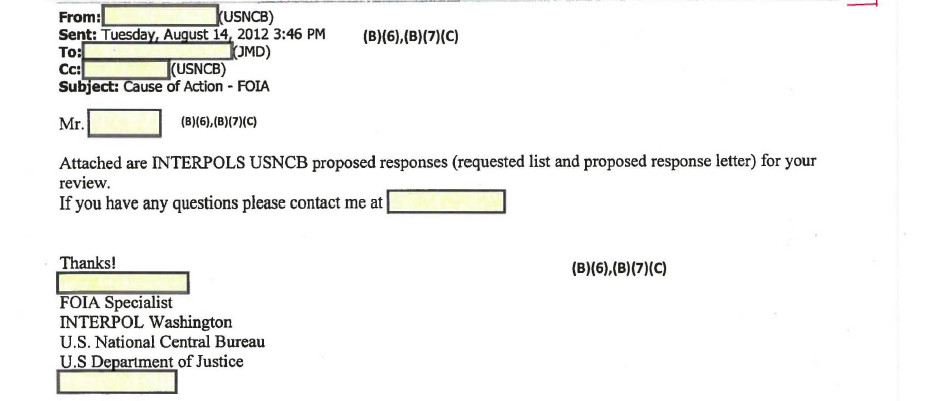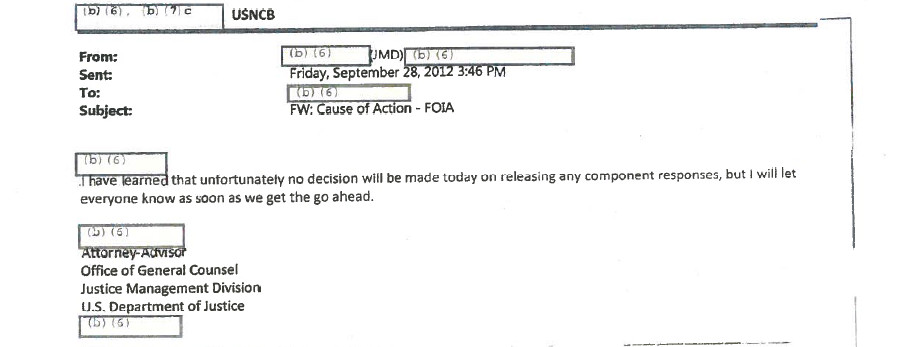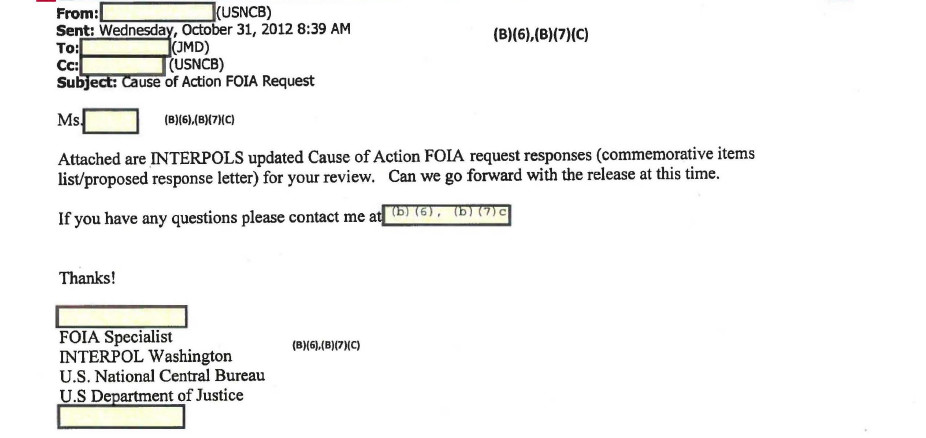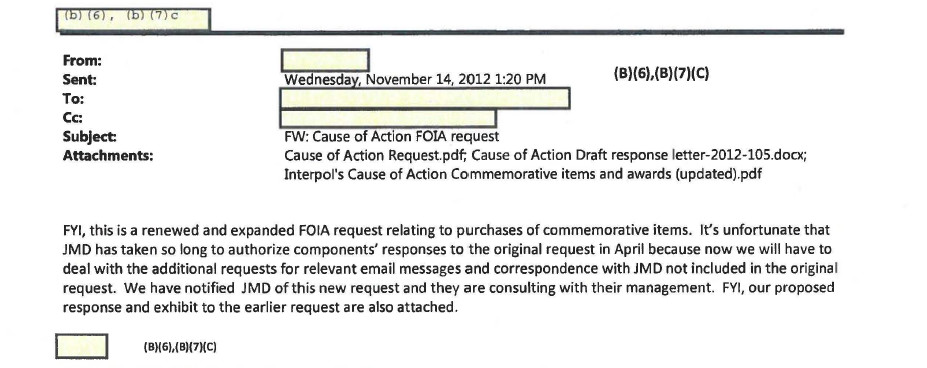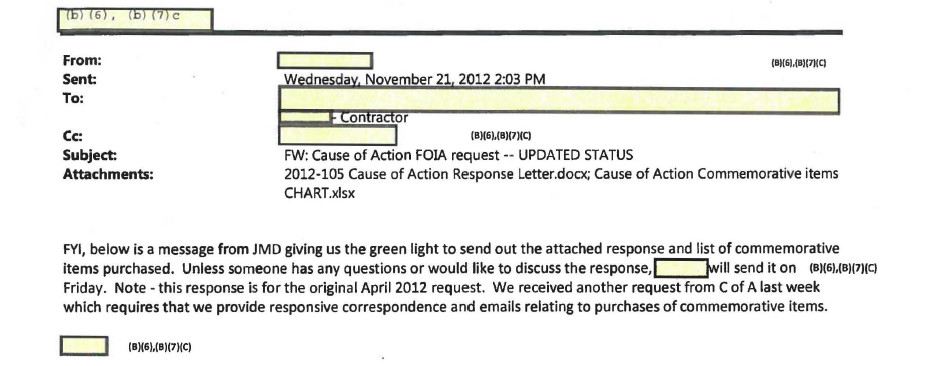On May 22, 2013, Cause of Action withdrew its FOIA request to PBS that was previously posted here.
FOIA request to the IRS regarding policies and practices concerning applications for 501(c)(4) status
CoA requests access to the following records pertaining to the Internal Revenue Service’s (IRS) Exempt Organization (EO) Division for the time period January 1, 2009 to the present:
- Copies of any criteria that the IRS Cincinnati Service Center has used to assess applicants for 501(c)( 4) status;
- Communications from the Treasury Inspector General for Tax Administration (TIGTA) to the EO Division concerning any audit or investigation conducted of the EO Division;
- Copies of any Form 990 Schedule B (Schedule of Contributors) released by the IRS to a third party in response to a Freedom of Information Act (FOIA) request, as well as copies of the IRS’s FOIA response letter to that request;
- All records, including documents and emails, relating or referring to any disclosure of an exempt organization’s Form 990 Schedule B to any employee, contractor or officer of the Executive Office of the President, excluding any such records disclosed pursuant to 26 U.S.C. § 6103(c) or 26 U.S.C. § 6103(g);
- All records, including documents and emails, referring or relating to any request from the President, Vice President, Cabinet official, employee in the Executive Office of the President, or employee in the Executive Office of the Vice President to any officer or employee of the IRS to conduct an audit or other investigation of any particular taxpayer; and a. If any requests are located in response to this item, then all communications between the IRS and TIGTA concerning those requests.
Click Here for the full request
Related work on the IRS:
FOIA Freak-Out: IRS Wrongly Denies FOIA Request, Comes Unglued Over Media Response
Cause of Action letter to the U.S. Attorney Kerry Harvey requesting an investigation of the IRS and their employees in the IRS Cincinnati Service Center in Kentucky for potential violations of the law concerning conspiracy by singling out organizations based on political views stated in their tax-exempt applications.
FOIA Freak-Out: IRS Wrongly Denies FOIA Request, Comes Unglued Over Media Response
(Photo via Politico and BGA Think Tank)
A little-known provision of the Internal Revenue Code, IRC § 6103(g), allows the President of the United States to request the tax returns of any individual or business he wishes. Concerned that the President may be asking for tax returns in order to retaliate against opponents of his administration, in March 2012 Cause of Action submitted a FOIA request to the Internal Revenue Service (IRS) seeking records of any presidential requests for these returns. The IRS denied our request in May, citing a provision that prohibits the release of private tax return information. Since Cause of Action asked only for any presidential requests for returns, not the returns themselves, we appealed the IRS’s decision. When the IRS denied our appeal as well, we sued for the documents’ release while also submitting an additional FOIA request seeking communications concerning our original request.
After months of back-and-forth between Cause of Action and the IRS, in October 2012 we were stunned to learn that the documents we’d been requesting since March had never even existed! According to the IRS Office of Disclosure, since the law’s inception in 1976 no president had ever requested tax returns through § 6103(g). Why it took the IRS seven months to disclose this important bit of information, plus a bona fide freak-out by IRS Counsel and Disclosure staff, is revealed in the following documents [Large file warning] received by Cause of Action in March 2013.
Take a look at these excerpts from an e-mail between Tax Law/ FOIA Specialists Valerie Barta and Janice Rudolph, dated May 21, 2012:
Ms. Rudolph agreed, concluding that Cause of Action was not privy to information regarding presidential requests for tax returns. Note that these specialists appeared to operate under the assumption that the records did, in fact, exist.
Cause of Action eventually filed suit on October 2, prompting immediate finger-pointing in the IRS’ FOIA division:
Ms. Barta’s response is telling:
Way to throw a colleague under the bus, Val. Ms. Barta and Ms. Rudolph both seemingly failed to inform management why they denied Cause of Action’s request or to convey the seriousness with which we threatened to take legal action. In fact, it appears that the two neglected to conduct a due diligence review of potentially responsive documents, instead relying on poor legal reasoning to prop up their contention that the documents would be exempt from disclosure. After we filed suit, IRS analyst David Nimmo returned to the issue and made a surprising discovery.
An excerpted e-mail from the afternoon of October 2:
Forgive us for feeling a little miffed that the IRS didn’t research this issue with Counsel before denying both our request and appeal. And since it took Mr. Nimmo a matter of hours to ascertain that no records existed, what exactly prevented Ms. Barta and Ms. Rudolph from conducting that most basic of searches five months previously?
Counsel’s research soon yielded an answer to whether the denial was done in error.
Senior Technician Reviewer Don Squires on October 3:
Counsel A.M. Gulas:
And Chief of Disclosure Gary Prutsman:
With it now established that the IRS had erred in denying our request, one would expect the agency to confess its mistake and quickly contact us to remedy the situation. But with journalists now asking questions, the IRS was hesitant to admit it had acted wrongly. In fact, all the press attention caused a bit of an office-wide freak-out.
Disclosure Chief John Davis responding to our press release and the resulting media inquiries on October 3:
Counsel A.M. Gulas after the Washington Examiner published a piece on October 4:
As the flames climbed higher, IRS firefighters worked to douse the blaze before it consumed their agency’s reputation:
Counsel Sarah Tate came up with a creative way to spin their original denial:
If that explanation sounds largely incomprehensible, that’s because it is. By this point the IRS was grasping for any justification that would allow them to avoid responsibility for their error. In the process, they wasted a tremendous amount of employee time and taxpayer dollars defending themselves in a pointless battle they could have easily avoided some months previously.
As we often do, Cause of Action alerted media when we filed our lawsuit against the IRS for refusing to disclose presidential requests for tax returns. After Politico and the Washington Examiner ran stories, media began questioning the IRS for a response. Although Cause of Action had been in contact with the IRS regarding our FOIA request and appeal for months, they only revealed that no documents existed to the Washington Examiner and the Washington Free Beacon. IRS officials apparently do not respect the FOIA process or even the judicial system, but instead will cave to media scrutiny.
After finally receiving written confirmation in late November that no responsive documents existed, Cause of Action dismissed the lawsuit on December 5; by that time, however, the damage had already been done. Because two FOIA analysts failed to undertake a simple search and instead relied on their own inadequate legal analysis, Cause of Action and the IRS were both forced to spend time and money on needless litigation. Even after it became clear no records existed, the IRS continued to obsessively protect its reputation rather than admit its error and move forward. Unfortunately, it appears that one must sue to ensure that IRS analysts conduct searches with the diligence and oversight that FOIA demands.
FOIA Freak-Out: DOJ Scrambles to Avoid Fallout Over Swag Purchases
When news of the General Service Administration’s (GSA) Las Vegas blowout broke in April 2012, Cause of Action was as appalled as anyone at the reckless waste of taxpayer dollars. But instead of focusing on mind readers and ritzy sushi receptions, we zeroed in on the unconscionable amount the GSA spent on baubles and trinkets commemorating the conference. Knowing that this kind of spending is all-too-common in the federal government, Cause of Action sent Freedom of Information Act (FOIA) requests to each government agency for all documents related to purchases of commemorative and promotional items over a three-year period.
While some agencies responded relatively quickly, others delayed production for weeks or even months. The Department of Justice (DOJ), in particular, took so long to produce documents that Cause of Action began to suspect the agency of deliberately dragging its feet. In November 2012 we sent another FOIA request to DOJ Interpol, this time asking for any communications regarding our original request sent seven months previously. When we finally received the documents, largely e-mail communications, in late January of this year, they revealed a department in the midst of a FOIA freak-out.
Check out this excerpt from notes taken during a DOJ Executive Officer’s meeting last May:
We’re flattered that DOJ bigwigs felt compelled to discuss Cause of Action’s request along with such important items as the Department’s budget and new management structure, but all that attention shouldn’t be necessary for a routine FOIA request. And what did they mean by commanding components to “stand down?” If they instructed employees already answering requests from FOX News and Bloomberg to stop their work and instead focus their efforts on Cause of Action’s request, that’s a major violation of the agency’s statutory obligations. FOIA regulations dictate that requests be addressed in the order they are received, not the order of their potential to embarrass the agency.
Then there’s this e-mail from DOJ Interpol’s Executive Office:
Call us old-fashioned, but Cause of Action believes agencies should follow the plain language of the law. And the plain language of the Freedom of Information Act states that agencies have 20 business days to respond to a request, even if only on an interim basis. That’s their “responsibility.” When a Director worries about “responding prematurely” after the Department has already sat on a request for three months, one has to wonder about that person’s motive. Is it to ensure that no stone is left unturned in the pursuit of relevant documents? Or is it to prevent damaging coverage of the department’s wasteful spending until the GSA conference scandal recedes from the public consciousness?
Perhaps the next few e-mails can shed some light on this question:
So, Justice Management Division (JMD) was tasked with reviewing all components’ responses before sending them on to Cause of Action. A little unorthodox, perhaps, but not unprecedented in our own experiences with federal FOIA procedures.
By August, DOJ Interpol had completed its document production:
After submitting it’s response to JMD, Interpol waited…and waited…
More than three months after submitting its production, Interpol finally received the long-awaited go-ahead:
In a stunning coincidence, JMD completed its review just one week after Interpol received our second FOIA request for communications regarding our original request. Funny how these things work out.
Although Cause of Action is still waiting on answers from a few more components, the documents we’ve received so far indicate that between January 2009 and June 2012, DOJ spent over $1 million on plaques, lapel pins, commemorative coins, and a whole slew of other trinkets for DOJ employees and contractors. The worst offender by far was JMD itself; in 2009 it spent $80,245 on awards alone for just one event, the Annual Attorney General’s Award Ceremony. In 2010 and 2011, as the rest of the Department scaled back costs in the face of a budget backlash, spending on swag for the Ceremony actually increased, to $160,137 and $172,845, respectively. When one DOJ component spends nearly half a million dollars on awards for three events in as many years, it’s clear that the GSA isn’t the only agency struggling with excessive and irresponsible spending practices.
Cause of Action believes that despite the attempts at transparency by some FOIA officers, Department of Justice leadership deliberately delayed our request rather than provide details on the embarrassing amount the agency spent on swag and trinkets. The high-level meetings, the fear of “responding prematurely,” the delays for a straightforward request; all this points to an agency hypersensitive to any and all reproach, obsessed with protecting its reputation at the expense of accountability and transparency. Rather than spending time and money shielding itself from criticism, perhaps DOJ should focus its resources on complying with FOIA law and serving the American taxpayer.
CoA Joins Coalition of Government Accountability Advocates in Asking FDA to Revise FOIA Policy
Earlier this week, Cause of Action was proud to join a number of other transparency organizations in sending a letter to the FDA concerning their FOIA deletions policy. Read more below from Open the Government and follow this link to see the letter.
Groups to FDA: Make FOIA Process More Accountable
“On Tuesday, March 8 OpenTheGovernment.org and 16 other organizations dedicated to openness and accountability filed a comment on a public petition urging the Food and Drug Administration (FDA) to you revoke the its Freedom of Information Act (FOIA) “deletions policy.” Public Citizen originally filed the petition in September 2012.
Under the FDA’s current FOIA policy, the agency redacts portions, referred to by them as “minor deletions,” of documents released without giving requesters an immediate right to appeal within the agency. The agency instead requires requesters to make a second request for “reconsideration” of any deletions before being allowed to appeal. If a requester does not do so, the FDA administratively closes the FOIA request without ever making a final determination. The agency does not define “minor deletions,” but in practice it relies on the policy to delete substantial portions – sometimes full pages – of documents.
As described in the comment, we strongly believe the policy violates both the letter and spirit of FOIA and casts serious doubt on the accuracy of FOIA performance data that FDA provides to Congress and the public. Public Citizen’s citizen petition on this matter has been pending for more than five months and alleges a serious violation of the law; it is high time for the agency to respond to it.
Find out more about the petition, and submit your own comment, here.”
CoA signs letters to President Obama, Oversight Committee re: FOIA
Today Cause of Action joined OpenTheGovernment.org and a coalition of watchdog/accountability groups in signing a letter addressed to President Obama to urge him to bring renewed attention to the Freedom of Information Act (FOIA).
We strongly agree with your statements in the January 21, 2009 Memorandum that the FOIA “encourages accountability through transparency,” and “is the most prominent expression of a profound national commitment to ensuring an open Government.” However, as we have discussed with you and your staff, delays and other barriers in FOIA practice at the agency level continue to prevent the public from timely access to information about the federal government’s activities.
Read the full text of the letter to President Obama here.
Cause of Action also signed a letter sent to Chairman Darrell Issa and Ranking Member Elijah Cummings of the House Oversight and Government Reform Committee to thank them for their work to hold agencies accountable for implementing FOIA.
As you point out in your letter, FOIA is an important option the public has for accessing information about the government’s activities. This tool is much less meaningful, however, if the public cannot use it to get timely access to the information to which they are entitled. Your letter is an excellent step towards identifying where a lack of oversight and attention on the part of OIP is contributing to these problems. We hope you will share your responses from OIP with the public, and look forward to future oversight hearings.
Read the full text of the letter to the Oversight Committee here.
White House Opens New Year with Open Data Mandate
In our blog outlining New Year’s resolutions for the federal government, we noted how a report from the Cato Institute gave the administration poor grades on data publication practices. The report found that, “the administration and the Congress both receive fairly low marks under systematic examination of their data publication practices.”
We are happy to learn that the administration is working towards improving its data public practices. According to Federal News Radio, the Office of Management and Budget will soon mandate that agencies release machine-readable data.
The change is part of the president’s Digital Management Strategy described in a May 23, 2012 report from the White House. An objective in the report states that, “We must enable the public, entrepreneurs, and our own government programs to better leverage the rich wealth of federal data to pour into applications and services by ensuring that data is open and machine-readable by default.”
Jim Harper, the author of the Cato report on government publication practices, called the change “good, not yet great.” He added that, “great would be the White House itself publishing machine-readable, open data when it issues the president’s budget in February. Along with the plan for fiscal year 2014 spending, why couldn’t we get the code that distinctly identifies each agency, bureau, program, and project—in essence, the organization of the U.S. federal government?”
There is still a lot of work this administration needs to take regarding open government and transparency, but we applaud this change. We hope OMB officially issues this mandate sooner rather than later.
